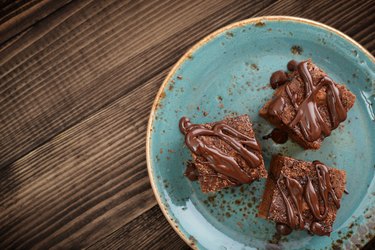
Eating sugar when you have a cold won't necessarily worsen your symptoms or delay healing. While it's true that sugar can be blamed for many things, from weight gain to heart disease, its effects on the immune system are controversial.
Most sugary foods lack nutritional value, so they won't help you get back on your feet. However, there is no evidence that sugar can make a cough worse or irritate your throat.
Video of the Day
Video of the Day
Tip
Sugar may indirectly affect your immune system due to its inflammatory effects. Stay on the safe side and limit or avoid sugary foods when you're sick to help your body recover faster.
Does Sugar Suppress Immune Function?
Sugar consumption is a contributing factor to diabetes, obesity and cardiovascular problems. In a large-scale study, heart disease mortality was 38 percent higher in subjects who consumed 17 to 21 percent of their daily calories from added sugar. Furthermore, this sneaky ingredient has been linked to weight gain and unhealthy eating habits. The results were published in JAMA Internal Medicine in April 2014.
Anecdotal evidence states that eating sugar when you have a cold may worsen your symptoms. Sugar is thought to suppress immune function and affect your body's ability to fight germs and recover from diseases. Most studies are controversial or inconclusive, though.
The above idea is based on a widely cited study featured in the American Journal of Clinical Nutrition back in November 1973. Researchers found that sugar significantly decreased the neutrophilic response within one to two hours after consumption. Neutrophils are white blood cells that ingest and destroy pathogens at the site of an infection, according to the National Cancer Institute. They play a key role in immune function.
To put it simply, the researchers found that sugar consumption may weaken your natural defenses and make it harder to recover from a cold. However, it's difficult to draw a definite conclusion based on a single study.
Another way in which sugar may affect immune function is by triggering an inflammatory response. The study published in JAMA Internal Medicine indicates a strong link between sugar consumption and inflammation.
According to a December 2017 review featured in Oncotarget, inflammatory cytokines may cause damage to the body's cells and organs, including the heart, liver, lungs, brain and digestive system, when produced in excess. Therefore, sugar consumption may affect organ function, which in turn, can reduce your body's ability to fight diseases.
Avoid Sugar When Sick
The above findings show that it might be better to avoid sugar when sick. However, there is no evidence to confirm a direct link between sugar consumption and cold or flu symptoms. To stay on the safe side, follow the American Heart Association's recommendations and try not to exceed 6 teaspoons of sugar per day if you're a woman and 9 teaspoons per day if you're a man.
Consider eating foods rich in complex carbs to ward off fatigue and regain your energy. Whole grains, legumes, starchy vegetables, brown rice and other whole foods are rich in vitamins, minerals and antioxidants in addition to slow-digesting carbs, points out the U.S. National Library of Medicine. Table sugar, on the hand, has no nutritional value.
Vitamin C may help too, according to a January 2013 research paper featured in the Cochrane Library. This nutrient won't prevent a common cold, but it may reduce its severity and duration and keep your immune system strong.
Bell peppers, cooked broccoli, red cabbage, guavas, oranges and pineapples are all excellent sources of vitamin C. If you have a sweet tooth, fill up on citrus fruits, papaya, strawberries or mangos. They're loaded with vitamin C and have just a few calories per serving.
How to Stop a Cough
Coughing, one of the most annoying symptoms of a common cold, can affect your sleep and overall wellbeing. As it turns out, honey might be one of the best foods for a sore throat and cough, reports the Mayo Clinic. A review published in the Cochrane Library in April 2018 supports these claims.
After analyzing several studies, researchers concluded that honey may reduce cough duration and severity to a greater extent than salbutamol (a medication prescribed for asthma, coughing and difficulty breathing), diphenhydramine (an antihistamine) or no treatment at all. Additionally, it has none of the side effects associated with most medications.
As the scientists note, the quality of the studies' evidence was low to moderate, given that some studies did not blind participants. Therefore, you should take these findings with a grain of salt. Also, be aware that honey has its share of side effects, such as nausea, vomiting, insomnia, drowsiness and stomach pain.
Warning
Honey may not be safe for infants as it can contain harmful bacteria. Children under one year of age have a weak immune system that may not be able to fight these pathogens.
When it comes to the common cold, prevention is your best defense. If you already have a cold, reach out to your doctor who may recommend dietary supplements, natural cough-suppressing medications or lifestyle changes to relieve your symptoms.
- Harvard.edu: "Eating Too Much Added Sugar Increases the Risk of Dying With Heart Disease"
- JAMA Internal Medicine: "Added Sugar Intake and Cardiovascular Diseases Mortality Among US Adults"
- American Journal of Clinical Nutrition: "Role of Sugars in Human Neutrophilic Phagocytosis"
- National Cancer Institute: "Neutrophil"
- Oncotarget: "Inflammatory Responses and Inflammation-Associated Diseases in Organs"
- American Heart Association: "How Much Sugar Is Too Much?"
- U.S. National Library of Medicine: "Complex Carbohydrates"
- Cochrane Library: "Vitamin C for Preventing and Treating the Common Cold"
- Dietitians of Canada: "Food Sources of Vitamin C"
- Mayo Clinic: "Honey: An Effective Cough Remedy?"
- Cochrane Library: "Honey for Acute Cough in Children"
- U.S. National Library of Medicine: "Albuterol Oral Inhalation"
- U.S. National Library of Medicine: "Diphenhydramine"